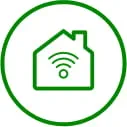How fast is your internet connection? Have you checked? Do you know? Do you care?
Knowing your internet speed isn’t just a matter of looking at your bill (and what do those numbers mean, anyway?).
In this post, we’ll go over how to check your internet speed with an internet speed test or a WiFi speed test, as well as why it matters.
What is internet speed?
At some point, you signed up for internet and you chose a speed that probably matched your needs. For households with minimal internet needs, this might be in the double digits, like 50Mbps. Homes with higher tech needs and many devices might have up to 1000Mbps. Now, that’s the download speed, aka the speed that the internet is flowing into your device. It’s measured in megabits, hence “Mbps.”
TL;DR: Download speed
o Represents how quickly data can be pulled from the internet to your device.
o Crucial for activities such as streaming, downloading files and online gaming.
Then there’s the upload speed, which is how fast data transmits from your home back out to the internet. Upload speeds are much slower than download speeds for cable and DSL customers because of how the technology was built.
TL;DR: Upload speed
o Indicates how fast data can be sent from your device to the internet.
o Essential for tasks like video conferencing, uploading files and online collaboration.
Read more: The internet speed revolution
Whether you have cable or fiber internet will determine the symmetry of your speed. Fiber internet is a relatively new technology, and it’s a game changer. Fiber uses pulses of light via thin glass lines to transmit data, and because it’s not beholden to the old cable infrastructure, it can send those data signals super fast and symmetrically. In other words, download and upload speeds are approximately the same, which translates to a faster connection.
Finally, there’s latency, also known as ping. While you want your speeds to be as fast as possible, you want latency to be as low as possible, because low latency equals a faster connection. Make sense?
TL;DR: Ping (latency)
o Measures the time it takes for a data packet to travel from your device to a server and back.
o Low latency is crucial for online gaming, video conferencing and real-time communication.
Read more: What is fiber internet and do I need it?
How do you test your speed?
You might be wondering, why not just look at my internet bill to see my speed? Yes, this is a good place to start, but it’s not the final answer. First of all, your internet company may not be clear about your upload speed, so you won’t even know the full picture. Second, internet speed slows down the moment it enters your home. The only way to get close to the full speed is to plug your device into the Ethernet port on your modem. But most people use WiFi in the home, so you’re undoubtedly going to see the speeds slow down, especially as you move farther away from the router.
Read more: Speed vs. bandwidth
Which brings us to the speed test. You don’t need any fancy equipment. You don’t even need to download another app. Visit a speed test website, like ookla.com, and click “Go.” In less than a minute, the test should be complete with your download speed, upload speed and ping.
Now what?
Now you know exactly how fast your internet speed is. Regularly checking your internet speed allows you to ensure that your connection meets your needs and can help you troubleshoot any issues that may arise.
You may be wondering why your tested speed is so much slower than the speed you signed up for. Again, this has to do with how far you are away from the router/modem and how far the WiFi has to travel to your device.
It could also have to do with the connection itself. If you think your speeds are significantly slower than advertised, or if you notice your internet connection is unstable or especially slow, you can call your internet service provider and ask them to check the connection. In more serious cases, they may need to send a tech. (Beware: they may charge you for this service visit.)
Read more: What internet speed do I really need?
If your internet is slower than you’d like and there’s nothing wrong with your connection, you may benefit from upgrading to a faster speed tier. Better yet, if you are experiencing slowdowns on cable, your best bet is to switch to fiber-optic internet, which is unmatched in speed and reliability.






